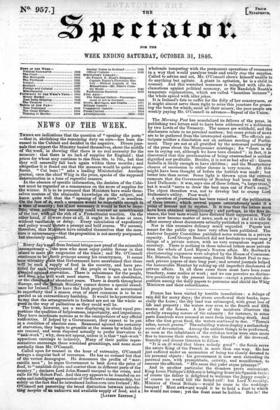Every day's m 1 from Ireland brings new proof of
the miserable incompetency u: the men who most enjoy public favour in that island to meet e exigencies of the times ; and Mr. O'Connell continues to be facile princeps among his countrymen. It seems now tolerably am that Government have ascertained that tbere will be such supply of food in the • country, and have pro- ' 'tied for such employment of the people at wages, as to have
ed.agains starvation- There is subsistence for the people,
and ho • ill work need starve. There is not abundance, or the chea f abundantyears. There is dearth throughout Europe, an ritish Ministry cannot decree a special abund-
ance for Ireland. :Nor have the Irish people been so accustomed to superfluity that a' season even of short commons is to be re- garded as an extraordinary hardship. It would be hypercriticism to say that the arrangements in Ireland are not on the whole as
i good in the way of palliatives as they could well be.
The Irish, however, are a race displayingiin about equal pro- portions the qualities Of helplessness, importunity, and impatience. They have inordinate notions as to the omnipotence of any official authorities. If helped by a Government, they expect to be put in a Condition of absolute ease. Reassured against the certainty of starvation, they begin to grumble at the means by which they are rescued, and seem disposed actually to prefer starvation to "task-work"; why, does not appear, unless it is that " task-work" apportions earnings to industry. Many of their public repre- sentatives encourage these wretched grumblings, and none more cordially than Mr. O'Connell. Called upon for counsel in the hour of extremity, O'Connell betrays a singular lack: of resources. He has no counsel but that of the veriest demagogue. He denounces theprofits of "mer- cantile men "; he urges Government to beat down the price of food, to "establish depots and scatter them in different parts of the country " ; declares Lord John.Russell unequal to the crisis, and calls for Sir Robert Peel. And this cry appears to be founded on no calm and intelligent appreciation of Sir Robert's statesmanship, but solely on the fact that he introduced Indian corn into Ireland ; Mr. O'Connell not perceiving the broad distinction between introdu- cing samples of an unknown and available supply of food, and a
wholesale tampering with the permanent operations of commerce in a way that would paralyze trade and really stop the supplies. Called to advise and act, Mr. O'Connell shows himself unable to do anything but agitate. A giant in agitation, he is a child in counsel. And this wretched nonsense is mingled with idle de- clamations against political economy, or Sir Randolph Routh's temperate explanations, which are called "heartless lectures"; the whole spiced with idler jokes. It is Ireland's fate to suffer for the folly of her countrymen, or it might almost serve them right to seize this juncture for grant- ing the boon for which; amid all their misery, the poor people are weekly paying Mr. O'Connell in advance—Repeal of the Union.


























